Tire TOYOTA T100 1997 User Guide
[x] Cancel search | Manufacturer: TOYOTA, Model Year: 1997, Model line: T100, Model: TOYOTA T100 1997Pages: 212, PDF Size: 3.17 MB
Page 130 of 212

126Use a washer fluid containing an anti-
freeze solution.
This product is available at your Toyota
dealer and most auto parts stores. Follow
the manufacturer's directions for how
much to mix with water.
Do not use engine antifreeze or any
other substitute as washer fluid
because it may damage your vehicle's paint.
NOTICE
Do not use your parking brake when there is a possibility it could freeze. When parking, put the transmission into
Pº (automatic) or into first or reverse
(manual) and block the front wheels. Do
not use the parking brake, or snow or wa-
ter accumulated in and around the parkingbrake mechanism may freeze, making it
hard to release. Keep ice and snow from accumulating
under the fenders.
Ice and snow built up under your fenders
can make steering difficult. During bad winter driving, stop and check under the
fenders occasionally. Depending on where you are driving,
we recommend you carry some emer- gency equipment.
Some of the things you might put in the ve-
hicle are tire chains, window scraper, bag of sand or salt, flares, small shovel, jump- er cables, etc.
Your vehicle is designed primarily as a
passenger - and - load - carrying vehicle.
Towing a trailer will have an adverse ef
fect
on handling, performance, braking, dura-
bility and driving economy (fuel consump-
tion, etc.). Your safety and satisfaction de-
pend on the proper use of correct
equipment and cautious driving habits.
For your safety and the safety of others,you must not overload your vehicle or
trailer. Ask your local T oyota dealer for fur-
ther details before towing. WEIGHT LIMITS
Before towing, make sure the total
trailer weight, gross combination
weight, gross vehicle weight, grossaxle weight and trailer tongue load are
all within the limits.
The total trailer weight and tongue load
can be measured with platform scales
found at a highway weighing station,
building supply company, trucking com-
pany, junk yard, etc.
Trailer towing
Page 132 of 212
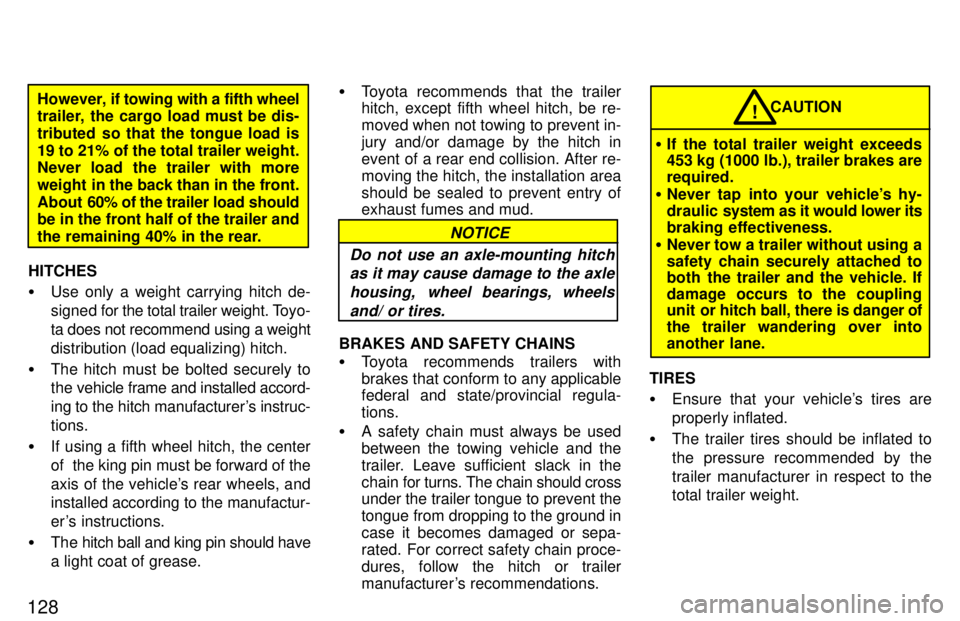
128
However, if towing with a fifth wheel
trailer, the cargo load must be dis-
tributed so that the tongue load is
19 to 21% of the total trailer weight.
Never load the trailer with more
weight in the back than in the front.
About 60% of the trailer load should
be in the front half of the trailer and
the remaining 40% in the rear.
HITCHES � Use only a weight carrying hitch de-
signed for the total trailer weight. Toyo-
ta does not recommend using a weight
distribution (load equalizing) hitch.
� The hitch must be bolted securely to
the vehicle frame and installed accord-
ing to the hitch manufacturer's instruc-tions.
� If using a fifth wheel hitch, the center
of the king pin must be forward of the
axis of the vehicle's rear wheels, and
installed according to the manufactur-
er's instructions.
� The hitch ball and king pin should havea light coat of grease. �
Toyota recommends that the trailer
hitch, except fifth wheel hitch, be re- moved when not towing to prevent in-jury and/or damage by the hitch in
event of a rear end collision. After re-moving the hitch, the installation area
should be sealed to prevent entry of exhaust fumes and mud.
Do not use an axle-mounting hitch
as it may cause damage to the axle
housing, wheel bearings, wheelsand/ or tires.
NOTICE
BRAKES AND SAFETY CHAINS � Toyota recommends trailers with brakes that conform to any applicable
federal and state/provincial regula- tions.
� A safety chain must always be used
between the towing vehicle and the
trailer. Leave sufficient slack in the
chain for turns. The chain should cross
under the trailer tongue to prevent thetongue from dropping to the ground in
case it becomes damaged or sepa-
rated. For correct safety chain proce-
dures, follow the hitch or trailer
manufacturer 's recommendations.
CAUTION
� If the total trailer weight exceeds
453 kg (1000 lb.), trailer brakes are required.
� Never tap into your vehicle's hy-
draulic system as it would lower its
braking effectiveness.
� Never tow a trailer without using a
safety chain securely attached to
both the trailer and the vehicle. If
damage occurs to the coupling
unit or hitch ball, there is danger of
the trailer wandering over into
another lane.!
TIRES � Ensure that your vehicle's tires are
properly inflated.
� The trailer tires should be inflated to
the pressure recommended by the
trailer manufacturer in respect to the
total trailer weight.
Page 135 of 212
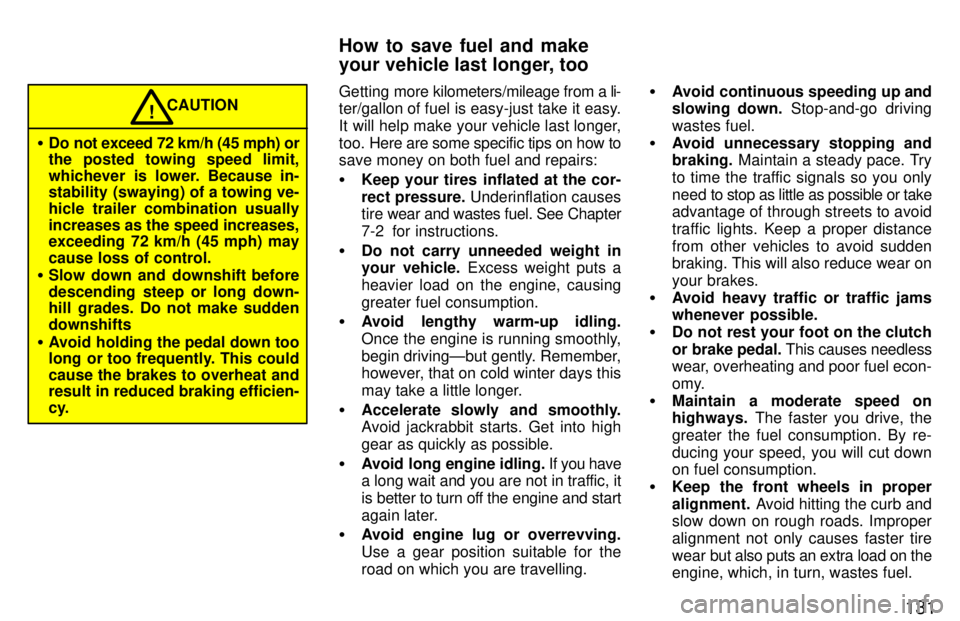
131
�Do not exceed 72 km/h (45 mph) or
the posted towing speed limit,
whichever is lower. Because in-
stability (swaying) of a towing ve-
hicle trailer combination usuallyincreases as the speed increases,
exceeding 72 km/h (45 mph) may cause loss of control.
� Slow down and downshift before
descending steep or long down-
hill grades. Do not make sudden downshifts
� Avoid holding the pedal down too
long or too frequently. This could
cause the brakes to overheat and
result in reduced braking efficien-
cy.
! CAUTION Getting
more kilometers/mileage from a li-
ter/gallon of fuel is easy-just take it easy.
It will help make your vehicle last longer,
too. Here are some specific tips on how to
save money on both fuel and repairs: � Keep your tires inflated at the cor- rect pressure. Underinflation causes
tire wear and wastes fuel. See Chapter
7-2 for instructions.
� Do not carry unneeded weight in
your vehicle. Excess weight puts a
heavier load on the engine, causing greater fuel consumption.
� Avoid lengthy warm-up idling.
Once the engine is running smoothly,
begin drivingÐbut gently. Remember,
however, that on cold winter days this
may take a little longer.
� Accelerate slowly and smoothly.
Avoid jackrabbit starts. Get into high
gear as quickly as possible.
� Avoid long engine idling. If you have
a long wait and you are not in traffic, it
is better to turn off the engine and start
again later.
� Avoid engine lug or overrevving.
Use a gear position suitable for the
road on which you are travelling. �
Avoid continuous speeding up and
slowing down. Stop-and-go driving
wastes fuel.
� Avoid unnecessary stopping andbraking. Maintain a steady pace. Try
to time the traffic signals so you only
need to stop as little as possible or take
advantage of through streets to avoid
traffic lights. Keep a proper distance
from other vehicles to avoid sudden braking. This will also reduce wear on your brakes.
� Avoid heavy traffic or traffic jams
whenever possible.
� Do not rest your foot on the clutch
or brake pedal. This causes needless
wear, overheating and poor fuel econ-
omy.
� Maintain a moderate speed on highways. The faster you drive, the
greater the fuel consumption. By re-
ducing your speed, you will cut down
on fuel consumption.
� Keep the front wheels in proper alignment. Avoid hitting the curb and
slow down on rough roads. Improper
alignment not only causes faster tire
wear but also puts an extra load on the
engine, which, in turn, wastes fuel.
How to save fuel and make
your vehicle last longer, too
Page 137 of 212
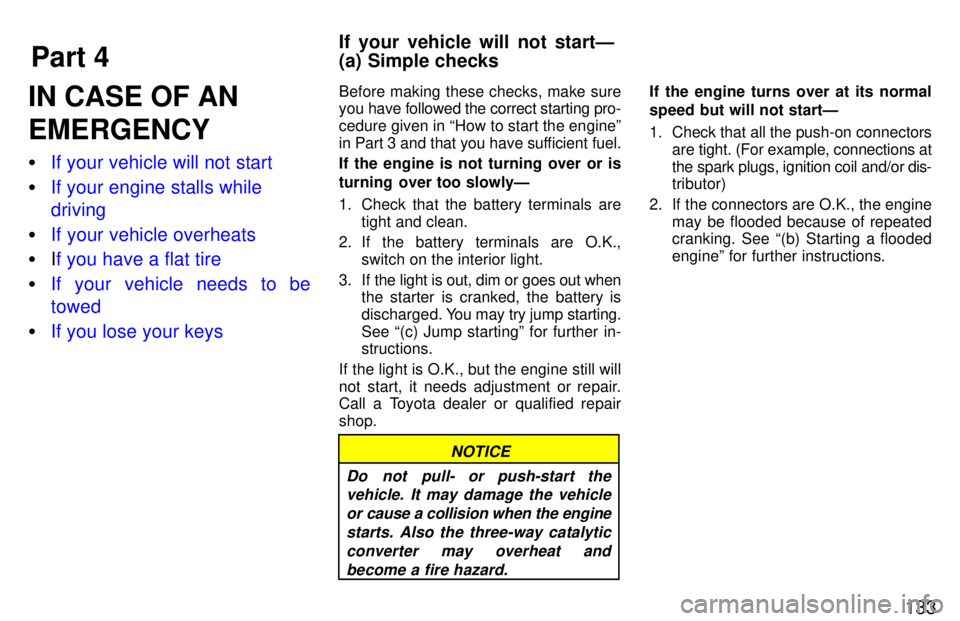
Part 4If your vehicle will not startÐ
(a) Simple checks
133
IN CASE OF AN EMERGENCY �
If your vehicle will not start
�If your engine stalls while driving
�If your vehicle overheats
�
If you have a flat tire
�If your vehicle needs to be towed
�If you lose your keys
Before making these checks, make sure
you have followed the correct starting pro-
cedure given in How to start the engineº
in Part 3 and that you have sufficient fuel.
If the engine is not turning over or is
turning over too slowlyÐ
1. Check that the battery terminals are
tight and clean.
2. If the battery terminals are O.K., switch on the interior light.
3. If the light is out, dim or goes out when the starter is cranked, the battery is
discharged. You may try jump starting.
See (c) Jump startingº for further in- structions.
If the light is O.K., but the engine still will
not start, it needs adjustment or repair.
Call a Toyota dealer or qualified repair shop.
NOTICE
Do not pull- or push-start the vehicle. It may damage the vehicle
or cause a collision when the enginestarts. Also the three-way catalytic converter may overheat andbecome a fire hazard.
If the engine turns over at its normal
speed but will not startÐ
1. Check that all the push-on connectors are tight. (For example, connections at the spark plugs, ignition coil and/or dis-
tributor)
2. If the connectors are O.K., the engine may be flooded because of repeated
cranking. See (b) Starting a flooded
engineº for further instructions.
Page 142 of 212
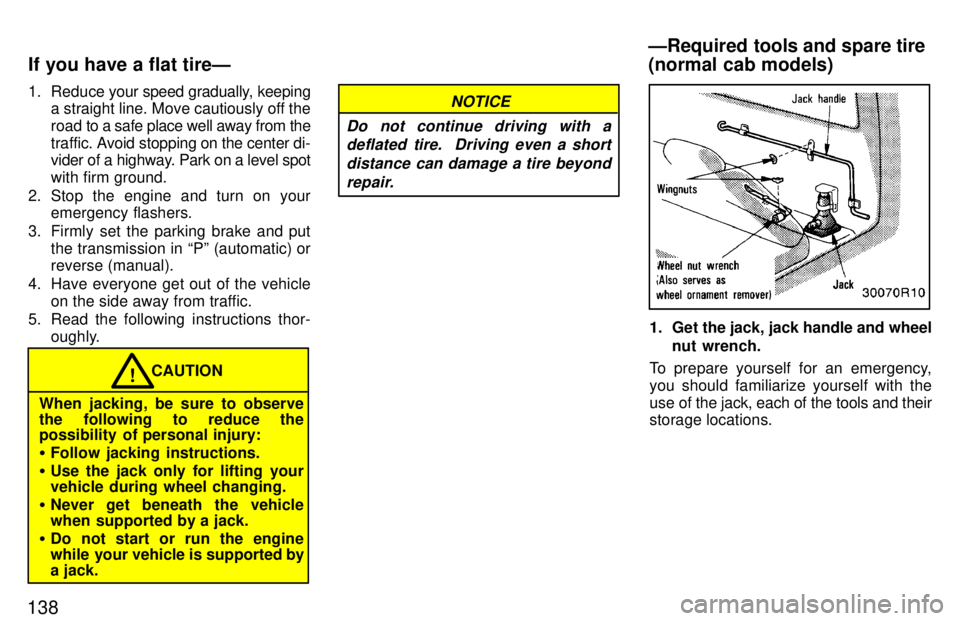
1381. Reduce
your speed gradually, keeping
a straight line. Move cautiously off the
road to a safe place well away from the
traf fic. Avoid stopping on the center di-
vider of a highway. Park on a level spotwith firm ground.
2. Stop the engine and turn on your emergency flashers.
3. Firmly set the parking brake and put the transmission in Pº (automatic) or reverse (manual).
4. Have everyone get out of the vehicle on the side away from traffic.
5. Read the following instructions thor- oughly.
When jacking, be sure to observe
the following to reduce the
possibility of personal injury: �Follow jacking instructions.
� Use the jack only for lifting your
vehicle during wheel changing.
� Never get beneath the vehicle
when supported by a jack.
� Do not start or run the engine
while your vehicle is supported bya jack. CAUTION
!
NOTICE
Do not continue driving with a deflated tire. Driving even a short
distance can damage a tire beyondrepair.
1. Get the jack, jack handle and wheel nut wrench.
To prepare yourself for an emergency, you should familiarize yourself with the
use of the jack, each of the tools and their storage locations.
If you have a flat tireÐ
ÐRequired tools and spare tire
(normal cab models)
Page 143 of 212

139
When removing the jack, turn the joint by
hand towards the CONTRACT direction
until the jack is free. When storing, turn
the joint by hand towards the EXPAND di-
rection until the jack is firmly secured to
prevent it from flying forward during a col-
lision or sudden braking.To remove the spare tire:
1. Insert the end of the jack handle into the lowering screw and turn it counter- clockwise.
2. After the tire is lowered completely to the ground, remove the holding brack-et.
When storing the spare tire, put it in placewith the outer side of the wheel facing up.
Then secure the tire, taking care that the tire goes straight up without catching on
any other part, to prevent it from flying for-ward during a collision or sudden braking.1. Get the jack and tool bag.
To prepare yourself for an emergency, you should familiarize yourself with the
use of the jack, each of the tools and their storage locations.
ÐRequired tools and spare tire (Xtra-cab models)
Page 144 of 212

140
When removing the jack, turn the joint by
hand towards the CONTRACT direction
until the jack is free. When storing, turn
the joint by hand towards the EXPAND di-
rection until the jack is firmly secured to
prevent it from flying forward during a col-
lision or sudden braking.To remove the spare tire:
1. Insert the end of the jack handle exten-
sion into the lowering screw and turn it
counterclockwise with the handle,
making sure the handle remains firmly
fitted onto the jack handle extension.
2. After the tire is lowered completely to the ground, remove the holding brack- et.
When storing the spare tire, put it in place with the outer side of the wheel facing up.
Then secure the tire, taking care that thetire goes straight up without catching on
any other part, to prevent it from flying for- ward during a collision or sudden braking.2. Block the wheel diagnoally oppo- site the flat tire to keep the vehicle from rolling when it is jacked up.
When blocking the wheel, place a wheel
block from the front for the front wheels or
from the rear for the rear wheels.
ÐBlocking the wheel
Page 147 of 212
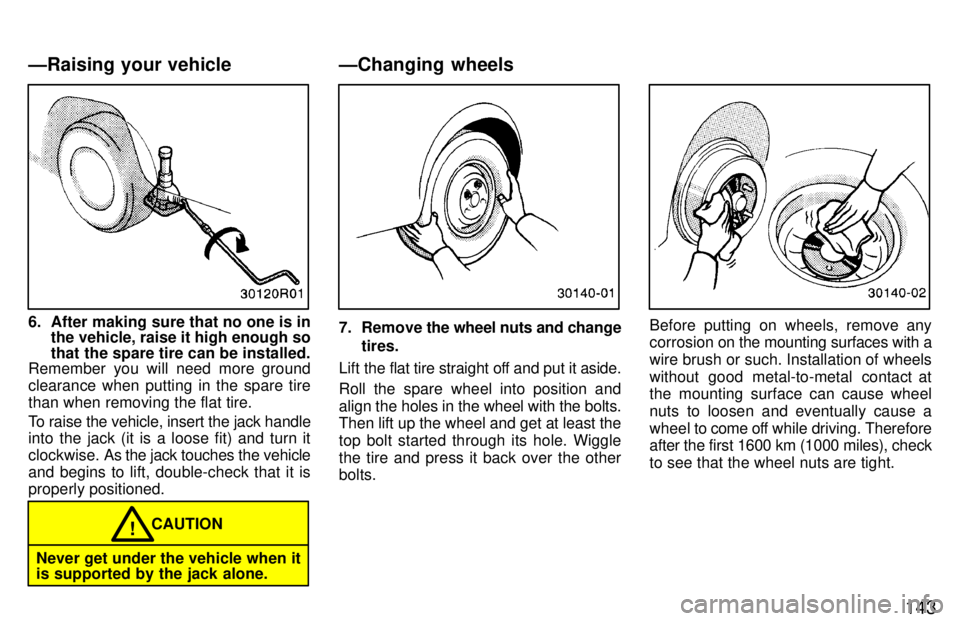
143
6. After making sure that no one is inthe vehicle, raise it high enough so
that the spare tire can be installed.
Remember you will need more ground
clearance when putting in the spare tirethan when removing the flat tire.
To raise the vehicle, insert the jack handle
into the jack (it is a loose fit) and turn it
clockwise. As the j ack touches the vehicle
and begins to lift, double-check that it is
properly positioned.
Never get under the vehicle when it is supported by the jack alone. CAUTION
!
7. Remove the wheel nuts and change
tires.
Lift the flat tire straight off and put it aside.
Roll the spare wheel into position and
align the holes in the wheel with the bolts.
Then lift up the wheel and get at least thetop bolt started through its hole. Wigglethe tire and press it back over the other bolts.Before putting on wheels, remove any
corrosion on the mounting surfaces with a
wire brush or such. Installation of wheels
without good metal-to-metal contact at
the mounting surface can cause wheel
nuts to loosen and eventually cause a
wheel to come off while driving. Therefore
after the first 1600 km (1000 miles), check
to see that the wheel nuts are tight.
ÐChanging wheels
ÐRaising your vehicle
Page 148 of 212
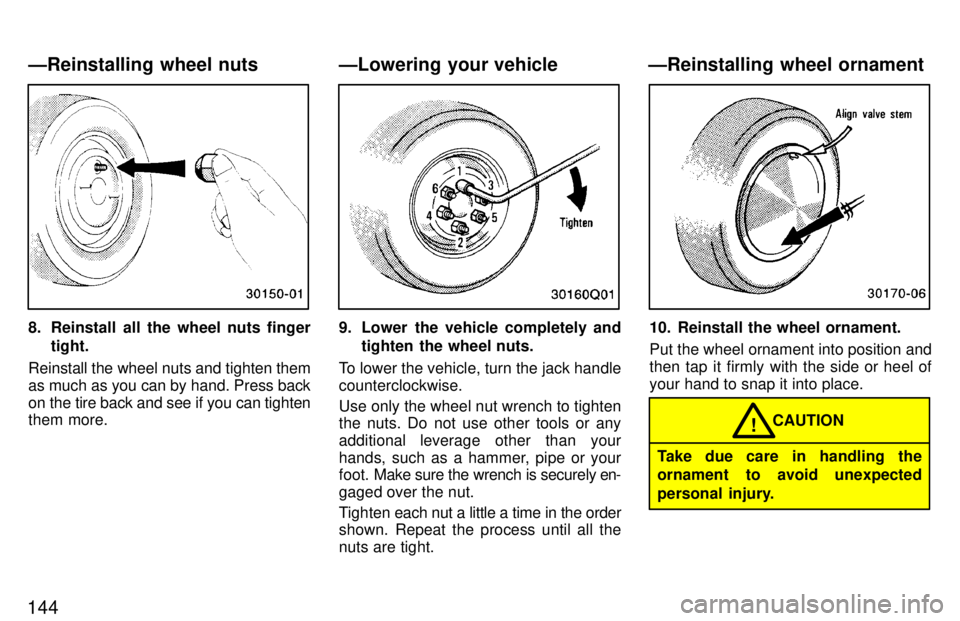
144
8. Reinstall all the wheel nuts fingertight.
Reinstall the wheel nuts and tighten them
as much as you can by hand. Press back
on the tire back and see if you can tighten
them more.9. Lower the vehicle completely and
tighten the wheel nuts.
To lower the vehicle, turn the jack handle counterclockwise. Use only the wheel nut wrench to tighten the nuts. Do not use other tools or any
additional leverage other than your
hands, such as a hammer, pipe or your
foot. M ake sure the wrench is securely en-
gaged over the nut.
Tighten each nut a little a time in the order
shown. Repeat the process until all the
nuts are tight.10. Reinstall the wheel ornament.
Put the wheel ornament into position and
then tap it firmly with the side or heel ofyour hand to snap it into place.
Take due care in handling the
ornament to avoid unexpected
personal injury. CAUTION
!
ÐLowering your vehicle ÐReinstalling wheel ornament
ÐReinstalling wheel nuts
Page 149 of 212
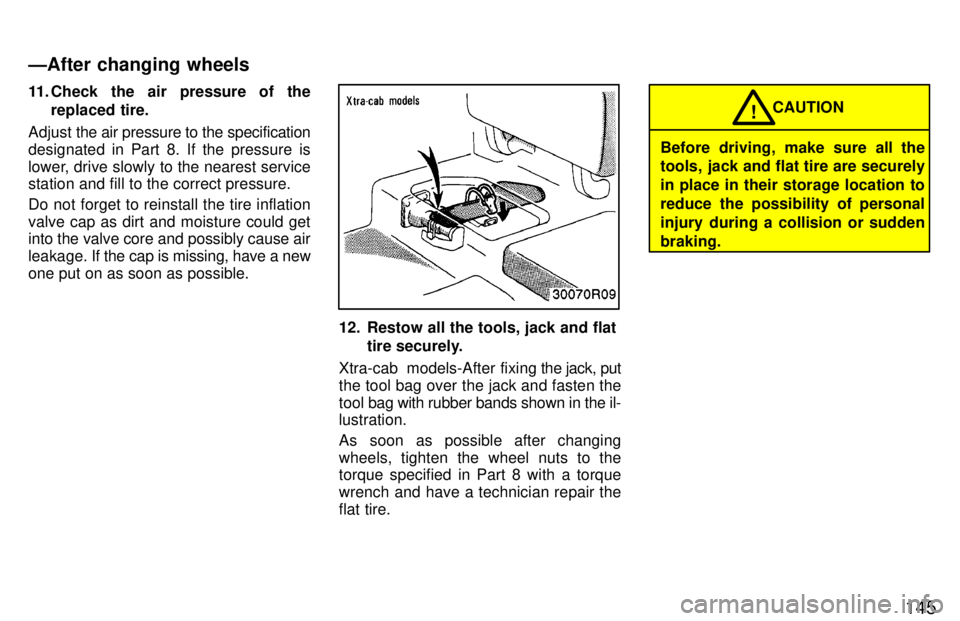
145
11. Check the air pressure of the
replaced tire.
Adjust the air pressure to the specification
designated in Part 8. If the pressure is
lower, drive slowly to the nearest service station and fill to the correct pressure.
Do not forget to reinstall the tire inflation valve cap as dirt and moisture could get into the valve core and possibly cause air
leakage. If the cap is missing, have a new
one put on as soon as possible.
12. Restow all the tools, jack and flat
tire securely.
Xtra-cab models-After fixing the jack, put
the tool bag over the jack and fasten the tool bag with rubber bands shown in the il-
lustration.
As soon as possible after changing
wheels, tighten the wheel nuts to the torque specified in Part 8 with a torque
wrench and have a technician repair the
flat tire.
Before driving, make sure all the
tools, jack and flat tire are securely in place in their storage location to
reduce the possibility of personal
injury during a collision or suddenbraking. CAUTION
!
ÐAfter changing wheels